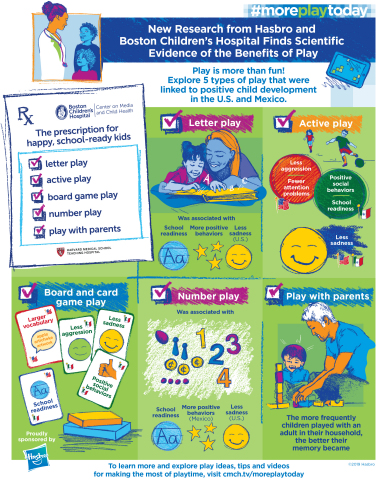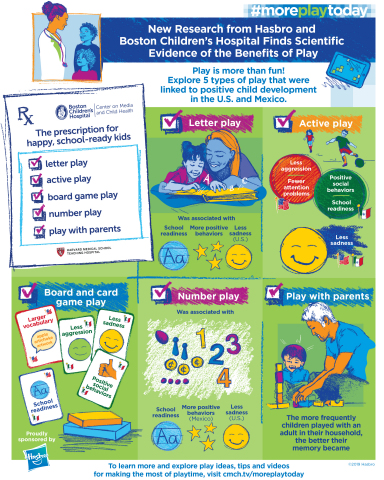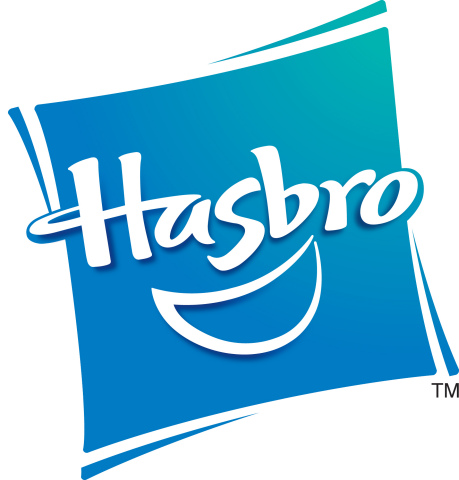PAWTUCKET, R.I. & BOSTON--(BUSINESS WIRE)--Hasbro, Inc. (NASDAQ: HAS), a global play and entertainment company, and Boston Children’s Hospital’s Center on Media and Child Health (CMCH) today revealed initial research findings showing that play is directly associated with positive developmental outcomes in children.
The multi-phase research initiative, #MorePlayToday, which began in 2016 and concluded data collection in 2018, enrolled 327 children between the ages of 2 ½ and 8-years-old in the U.S. and Mexico, and evaluated how different types of play affected their developmental outcomes. No other academic play research has followed a sample for this long with such intensive measurements with multi-country longitudinal participants.
“It’s important for parents, caregivers, physicians, and educators to understand that play is more than just fun,” said Michael Rich, MD, MPH, Founder and Director of CMCH. “Based on the initial findings from our research, the CMCH prescription for happy, school-ready kids is more letter play, more number play, more board game play, more active play, and more play with their parents,” said Rich, who is also Associate Professor of Pediatrics at Harvard Medical School and Associate Professor of Social and Behavioral Sciences at the Harvard T. H. Chan School of Public Health.
Initial findings from the research include:
-
Active play was associated with less sadness:
- In both countries, active play was associated with less sadness, anxiety and fearfulness.
- In the U.S., active play was also associated with less aggression and fewer attention problems.
- In Mexico, there was also an association with more positive behaviors and more school readiness.
-
Letter and number play were linked to school readiness and other positive behaviors:
- The research found that letter and number play were associated with school readiness in both countries.
- In the U.S., both letter play and number play were associated with less sadness.
- Additionally, in Mexico, letter and number play were associated with more social competence (such as respect and empathy), and to a lesser extent, less aggression.
-
Board and card games were associated with school readiness and other positive outcomes:
- The research found that board and card games were associated with school readiness in children in both the U.S. and Mexico.
- Board and card games were also associated with a larger vocabulary in the U.S., and with less aggression, less sadness, fewer attention problems and more positive social behaviors (such as being more thoughtful and considerate of others) in Mexico.
-
Play with adults was associated with better memory:
- The research found that in the U.S., the more frequently children played with adults in the household and directed the play, the better their memory became.
This collaboration was inspired by Hasbro’s desire to help caregivers navigate the balance between technology and play in their children’s lives.
“Our first priority is the well-being of children and their families, so we felt it was our responsibility to champion research to understand the implications of play and media use on children’s development,” said John Frascotti, President and Chief Operating Officer, Hasbro. “The team at CMCH developed pioneering methodology for this research which goes far deeper than any past academic research on play, and we hope these results will offer caregivers, teachers and medical professionals useful guidance on which types of play serve the developmental needs of children.”
This collaboration supports Hasbro’s purpose of making the world a better place for children and their families, and it reinforces CMCH's mission to educate and empower children and those who care for them to create and consume media in ways that optimize children's health and development.
For more information, including tips and ideas on how to make the most of playtime, visit https://cmch.tv/moreplaytoday/.
About Hasbro
Hasbro (NASDAQ: HAS) is a global play and entertainment company committed to Creating the World's Best Play Experiences. From toys and games to television, movies, digital gaming and consumer products, Hasbro offers a variety of ways for audiences to experience its iconic brands, including NERF, MY LITTLE PONY, TRANSFORMERS, PLAY-DOH, MONOPOLY, BABY ALIVE, MAGIC: THE GATHERING and POWER RANGERS, as well as premier partner brands. Through its entertainment labels, Allspark Pictures and Allspark Animation, the Company is building its brands globally through great storytelling and content on all screens. Hasbro is committed to making the world a better place for children and their families through corporate social responsibility and philanthropy. Hasbro ranked No. 13 on the 2019 100 Best Corporate Citizens list by CR Magazine, and has been named one of the World’s Most Ethical Companies® by Ethisphere Institute for the past eight years. Learn more at www.hasbro.com, and follow us on Twitter (@Hasbro) and Instagram (@Hasbro).
About Boston Children’s Hospital
Boston Children’s Hospital is ranked the #1 children’s hospital in the nation by U.S. News & World Report and is the primary pediatric teaching affiliate of Harvard Medical School. Home to the world’s largest research enterprise based at a pediatric medical center, its discoveries have benefited both children and adults since 1869. Today, 3,000 researchers and scientific staff, including 8 members of the National Academy of Sciences, 18 members of the National Academy of Medicine and 12 Howard Hughes Medical Investigators comprise Boston Children’s research community. Founded as a 20-bed hospital for children, Boston Children’s is now a 415-bed comprehensive center for pediatric and adolescent health care. For more, visit our Discoveries blog and follow us on social media @BostonChildrens, @BCH_Innovation, Facebook, Instagram and YouTube.
About CMCH
The Center on Media and Child Health (CMCH) at Boston Children’s Hospital (BCH) is an academic research center whose mission is to educate and empower children and those who care for them to create and consume media in ways that optimize children’s health and development. Founded in 2002 by pediatrician, father, and former Hollywood filmmaker Michael Rich, CMCH focuses on media as a powerful environmental health influence, like the air we breathe and the water we drink. We seek to understand the positive and negative health impacts media can have and find ways of making media the most positive possible influence in children’s lives. Lean more at www.cmch.tv, and follow on Twitter (@cmch_boston) and Instagram (@cmch_boston).




